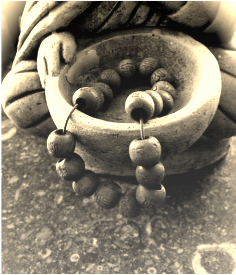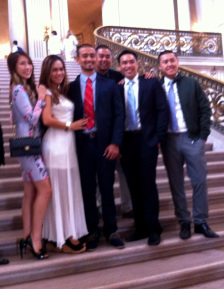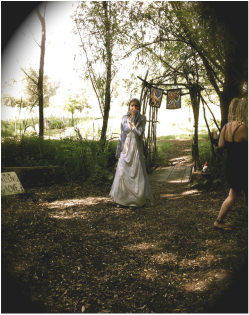 Foxie shares Thanksgiving photo op Foxie shares Thanksgiving photo op Thanksgiving morning on the phone with my sister, we small talk but not for long because over the years we have learned how to love and understand each other and speak from our hearts not too many minutes into a conversation.
For neither of us would this holiday be “ideal,” in as much as Thanksgiving is traditionally a day about family. Her family is a daughter, asleep in the extra bedroom but probably with plans of her own which don't include the free-range organic turkey my sister been roasting. Another family wants to include her daughter at dinner. My sister has been invited, but isn’t sure that’s the family Thanksgiving she wants though the house is within walking distance.
One of my sons is in the Philippines so rule out dinner with him. The oldest son has become Chef Vegan, living his holiday through photos on Facebook, so connection with him will be adding a comment under his postings of gluten-free pumpkin muffins, the third batch, baked to perfection.
The youngest son has driven his daughter to visit many cousins on her mom’s side of the family. The other grandma is with them. They are miles east of Oakland for their holidays.
So my sister and I concur that we are not going to have the day our way. But we don’t despair. We are not actually resigned to doing the best we can; we’re more upbeat than that. Not to be grateful for being alive would be a mistake; moreover, other people have offered us their company and are including us in their plans. This is generous of them. We agree on our marching orders for the day. It will come in the form of a question that’s not really a question: How Hard Is It?
My sister concludes that it isn’t that hard is to walk a few blocks, carrying her little organic turkey to be with her daughter although in the home of her former husband’s new family. It will not be exactly the day she would have planned, but really, how hard is it?
How hard will it be for me to accept the invitation of a new friend to attend a Christian Science Thanksgiving Service at her church, which is a four-block walk. It will mean a lot to her to walk there with a friend. How hard is it? And when a staff member at the Hotel Lake Merritt learns my grandson and his wife will not be joining me on Thanksgiving, she suggests I join her and two others at the table she has reserved. How hard is it to graciously accept her invitation? To meet new people? It’s not so hard. Though it’s not the day I planned, not my vision of sharing with close family, yet there will be pleasure. It doesn’t have to happen just my way. Indeed, how hard is it to say yes when good people offer to include you? Wasn’t that the basis of Thanksgiving in the first place?
 Bracelet in the Buddha bowl /Alison Bracelet in the Buddha bowl /Alison I wear a simple bracelet of 19 wooden beads strung loosely on a brown stretchy string not just because my Buddhist meditation teacher gave it to me, but because it serves as a reminder to be mindful and more. Some people tape messages to their mirrors or post them on the fridge with a magnet so as not to forget lessons worth learning. For me this bead bracelet from my teacher is an especially apt metaphor for a lesson I need to remember.
It was a painful interaction with the teacher who gave me the bracelet that impressed on me that it really is a good idea to pause before reacting. It’s practically sacred! At one of our biweekly practice talks, my teacher mentioned wanting to talk to me about money.
When I heard that word “money,” I jumped into a story about myself that brought up feelings of shame. I hated to feel inadequate. I braced to be criticized. I wanted to grab my shoes and run away from where I sat facing her, but instead I gripped the sides of the chair and grabbed anger in self-defense. I probably tried to point out that any misunderstanding could not have been my fault. Anger armored me against the painful and familiar fear of been wronged as well as against my teacher for the pain I was feeling. Through my tears I probably said that I thought I understood our agreement. That everything between us was good.
She watched me cry, watched me fume, and sat unmoved, her expression unchanging. In a level unemotional voice, she said she was going to ask me to put the agreed upon amount of dana in an envelope even one that I was recycling. That’s about what she said.
I got it. Familiar painful feelings had taken me out of the room, taken me out of her presence into self-stories, old stories of unworthiness that brought up shame and suffering. For fear of being caught in a mistake, I had over-reacted. A pause would have left room for her to say what was on her mind.
When I look at the beads on the bracelet with their faint writings, I see reactions based on stories imprinted from childhood. And as with most of what sticks to us, these stories tend to be negative. As for the stretchy string between the beads, I make it represent the space and stillness between these stories – space for other people, for their opinions, needs, and responses. I make the message of the string be: Stop and Ask: “What else is there” … to say, to do, to understand” “What else is there that wants acceptance and a response?” The flexibility of the string reminds me to hold space for possibilities and mystery, to be still and open to everything and for everyone in our shared universe.
 Old tree on the shore of Lake Merritt / Alison R. Old tree on the shore of Lake Merritt / Alison R. With the move to Oakland from San Francisco behind me, and escrow in the throes of closing, I see how fearful I have been. Dread became a constant companion, varying from low level in the background to in my face, full blown.
Mostly, I didn’t deal with my fear as much as rely on diversions – Buddhist teacher Tara Brach would call them “false refuges.” – I juggled 20 games of Letterpress on the phone as well plowed through online New York Times crossword puzzles on my tablet. Access to streaming Netflix hooked me on the TV show “Criminal Minds” with its multiple seasons, reliable formats and lack of commercials. And I took hits of serotonin scrolling through email several times a day. And of course, walking Foxibeau around Lake Merritt diverted us both.
Yet no matter my efforts, fear flamed up in outbursts. My real estate agent with my future in his hands got a fair dose. Often I would ask him what I was going to do when escrow fell through. As my friend, he said he hated to see me so “negative.” Sure, I trusted him and yet I couldn’t or wouldn’t believe everything would go as planned. All of our paperwork took place on the computer, and I was so rattled I would settle for the first signature that suggested itself when signing Docu-sign paperwork, the long-distance method which seems to have replaced side-by-side page turning. Without a reassuring agent by my side pointing to each blank to sign or initial, for all I knew I might have been buying the unit next door to the one I thought I was selling.
Behind fear about the sale of my property in San Francisco, I hesitated to make this particular move to a senior residential hotel as it really spoke to my aging and the probability of eventual dependence. In the past I chose not to act on my wish to receive more care and kindness. I tended to scoff at aging friends who went ahead and paid to be treated with respect. Now, I have done likewise. Still fearful of having made the wrong decision, I feel gratitude for the daily acts of kindness, even though I pay to receive them. And it is lovely to live across the street from a lake encircled by what one resident called a “rosary” of tiny lights.
In truth, I chose this spot as a destination my son would happily bring my granddaughter to visit. In the month or so since my move, he has not scheduled a trip although I’m sure I tempted him with tales of the lake, the gondola rides and Fairyland. My head accepts the facts of his life, but when I see the “kids” of other residents drop by to check on their moms or dads; my heart feels sad. I expect compassion will compel me to accept both the head’s reasoning and the heart’s yearning.
And perhaps the wisdom credited to old age will show me how to be on this side of the Bay and connect with the other side like other commuters. I am already an expert at diversions, so I can connect to music or dharma talks with headphones or read an Oakland Public Library book while bowing to the vicissitudes of public transportation, grateful for my Clipper discount and the seats reserved for the elderly and the infirm.
And though only a month or so has passed since I conveniently lived within walking distance of the opera and symphony in San Francisco, I am learning to embrace aging. I haven’t yet refused the six-block trek to and from the19th St. BART, but I don’t plan to do it more than once a day. Weekends I might drive to and from city commitments, but I will be smart about when to venture bridgeward.
My prayer is that fear will be a teacher once I step back from the brink of panic and realize I have done okay so far. Well done, I am saying to myself.
 Flower tears/faux_to digit Flower tears/faux_to digit The more attached I am to my agenda, the more irritated I become when nothing and no one seems to cooperate. I tend to take each delay or disappointment personally, as if the world and its denizens conspire against me. Since moving to a retirement hotel for older adults at Lake Merritt in Oakland September 25, I have been back to the city six times in five days. Between traveling the Bay Bridge and relying on public transportation, crowded BART and Muni shove matches I have experienced what seems like a lot of anxiety and irritation. Impatience is as good a name as any for the unpleasant feeling.
Moreover, I have 7:30 breakfast every Monday in Noe Valley with a friend and moving to the East Bay hasn’t changed that pleasurable routine. And yet impatience clearly encroached this last Monday when after breakfast I would have liked her to put my welfare over her own and rather than dump me on the 49 line because it was more convenient for her, have driven me to my meeting at the church. And as much as I love this friend, I was annoyed which felt the same as impatient. I became a small, constricted self, a wronged being who clearly didn’t matter all that much. And I didn’t like myself for being an unloving, ungenerous friend.
AND whether I’m traveling on BART or Muni or on foot, breakfasting with a friend, or meeting with the minister, I fret that my condo won’t sell fast enough at the too-high price I’m asking. I am disappointed at being this avaricious while professing aversion to economic inequality.
Yet when I sit still, recognize, acknowledge and inquire into this feeling I’m calling impatience and fear, it doesn’t boom with annoyance, it whispers, “What about my needs? Don’t they matter? Am I going to be overlooked? Am I going to get enough? In short, how long am I going to have to scream in this crib for a diaper change? I’m seeing my impatience as one cover up for vulnerability.
I believe “What about me?” to be what humans feel, not just what I feel. One night around the dinner table at the Hotel Lake Merritt amid older adults, I mentioned impatience, and many of these new acquaintances were quick to own it as a personal bad habit. Stories went around the table about being seated in this very dining room before another group was seated, but not being served before it.
Unjustly, I think we would all call this reaction petty. I think it’s bigger than that, not worse, just bigger in as much as it constricts our focus, it narrows our attention just to the piece of the moment that has to do with personal discomfort and thus shuts out mostly everything else.
Writer, Storm Jameson puts it like this, “There is only one world, the world pressing against you at this minute. There is only one minute in which you are alive, this minute here and now. The only way to live is by accepting each minute as an unrepeatable miracle. By releasing our attachment to having life a certain way, we receive the blessings of the awareness that is always and already here.”
Public transportation, bridge congestion remind me that life is the present, and the present isn’t necessarily pleasant, but it is the moment I have, the moment I chose. And lessons can be learned from everything and everyone.
 Sheena, Elison and friends / Alison R. Sheena, Elison and friends / Alison R. I’ve had a week of thinking about intimacy. My grandson married his love in a beautiful, on-time ceremony at City Hall. They asked me to be a witness. Nothing more. They planned it themselves, and it couldn’t have been nicer. My hope for them is that they enjoy the intimacy that loving can foster.
I had another glance at the possibilities of intimacy, if only for a moment, at the service on Sunday given by the Unitarian Universalists’ new minister. We shook hands after the service and he mentioned our week-ago conversation about Flannery O’Connor. In that personal, intimate moment, I felt seen. If he responds to everyone as though each matters, the whole will be equal to, if not greater than, its parts! The church will become vibrant with knowing and being known.
A third bout with the idea of intimacy occurred at a Zen Center dharma talk. The priest related an eighth century Koan, one of those paradoxical stories like “what is the sound of one hand clapping?” These stories, usually very old, take the mind beyond its habitual way of making meaning. In the story she shared, “Lingzhao’s Helping,” an old man, Layman Pang, loses his footing on a bridge as he and his daughter, Lingzhao, go home from selling bamboo baskets. When she looks back and sees that he has fallen, she runs to him and throws herself down next to him. He asks her what she is doing. She says she is helping. He then says it is good no one is looking.
My reaction to this koan missed the mark. I didn’t see how her behavior could be called helping. I thought she should want to get dad off the ground as quickly as possible. But this story is about becoming intimate with another’s situation before assuming the role of helper. The daughter’s behavior suggests a way to be with another person that isn’t hierarchical. At Dad’s level she sees what it is like for him. She doesn’t become “the helper” making her Dad “the victim,” shifting into an uneven relationship. She doesn’t assume she knows what to do before she sees from her father’s vantage place. But by being down with Dad, Lingzhao metaphorically becomes intimate with his situation. And when Dad says it’s good no one is looking, he isn’t expressing concern for what the neighbors might think; he is complimenting her for staying authentic and free of self-judgment, of not seeing herself from a removed point of view.
At home, after hearing the dharma talk, I read the koan as it appears in The Hidden Lamp, Stories from Twenty-Five Centuries of Awakened Women. Zen teacher Joan Sutherland’s reflection on this koan, expanded my understanding of intimacy. Not fond of hierarchy to begin with, I loved the idea of avoiding habitual hierarchical relationships that would separate me from another. I thought of the hierarchy inherent in a new minister’s coming and hoped he would not put himself above, but in front, of the rest of us.
Most important to me was seeing the need to become intimate with the other’s situation before assuming the “role” of helper or thinking I knew better what would help. And I wondered if cultivating intimacy with my own thoughts and feelings by just being with them might work better than wanting to change them or deny them.
As for the koan, I am guessing if and when Layman Pang is ready to get up from the ground and gather the bamboo baskets that may have scattered in his fall, he will ask Lingzhao for a hand up. Until he does, they might lie side by side and giggle. As for me, my attitude toward intimacy has expanded.
 Constriction at Green Gulch Farm / Jed Sullivan Constriction at Green Gulch Farm / Jed Sullivan I went to a writing workshop at Green Gulch Farm, a Buddhist practice center offering training in Zen meditation and what it terms “ordinary work.” It is on Shoreline Highway almost to Muir Beach. Sixteen participants hoping to “awaken and enlist the senses” chose on that overcast Saturday to do their work with Laura Deutsch whose Writing From the Senses had been recently published by Shambala Press.
For about two and a half hours of the morning I sat in the circle and suffered familiar self-aversion. I felt shut down. Dry. A fake. How can I call myself a writer? Writers have something to say. Laura tried to warm us up with prompts for seven-minute free-writes. When time was up, she tapped the singing bowl; we stopped writing and shared.
The first prompt dropped me deeper into depression: Your Sock Drawer! Believe it or not I scribbled an apology. I don’t have a sock drawer. Does everyone have a sock drawer? Is this one more failure on my part? I tell it like it is. I have no sock drawer and this reminds me of the socks I do have, where they are and what if I die and my sons have to rummage through the drawers, not necessarily looking for socks, but probably they will have to get rid of things. I did this with my sister when my mother died. But her drawers were preternaturally neat. At 96 Hannah didn’t wear socks, per se; she still had panty hose. The top drawer of my dresser with its scattering of socks and other things could be a challenge for my sons. I vow to go home from the workshop and immediately relocate a “not-sock item” I think might embarrass them if they lift a pile of black compression knee-highs and come upon it accidentally. Of course, doing a free-write, I can say exactly what that not-sock thing is and hope they will never decipher the free-write if I haven’t destroyed it by then. At the sound of the singing bowl, I don’t offer to read what I have written, mostly because I wrote in such a hurry, much of it is illegible.
I set the lunch break as the time when I would decide whether or not to eat and run. But in the dining room, a woman I thought I recognized recognizes me as “the funny, and inspiring” (her words) facilitator of weight-watcher meetings she once attended. She was generous with her recollections of having learned from me, of admiring my “teaching.” The warmth of her appreciation unfreezes my heart. Maybe I did have something to say and it was okay to sit among writers, not an imposter and free to appreciate this learning opportunity as if it were my “ordinary work” as well as theirs.
I tell myself to lighten up on my shortcomings. If today I am not a writer it will be because during our seven-minute free-writes, I have been scribbling with a pencil and don’t recognize many of the words on the page, most of the letters are the same height and the tees aren’t crossed. Moreover, I have come to this workshop badly organized. When I want to write on the backs of pages, I have to tear the white legal-sized sheets from the perforated top of the tablet. Often the paper rips, interrupting the top line of words. A three-hole punch would not be useful organizational tool because I have written into the margins. A number of these pages have tumbled from my lap and are scattered next to the chair in that circle of many very good and some published writers.
After lunch we circled up in groups of four to continue the workshop. By this time, I have decided that all the writers, including the teacher, are rooting for me. Even I believe in my Buddha Nature. I can and will do these free-writes…this ordinary work. When the workshop ended, I bought Laura’s book. She wrote in the flyleaf: “To Alison, Keep up your wonderful writing.”
Naturally, I questioned the “wonderful,” but keeping it up as if writing were my “ordinary work” made sense. And as for the not-just-socks drawer? I’ll do what any good mother would do.
 Deer at Rossmoor Parkway / D.H. Ryle Deer at Rossmoor Parkway / D.H. Ryle Watching my son sweep shards of glass from the seats after his car was broken into during the day in front of the condo where I live, I knew if I wanted him and my granddaughter to visit again, I might have to move. Suddenly, I visualized his pleasure visiting me in a safe haven near a golf course.
Some friends who had recently moved to Rossmoor, a gated-community for those 55 and over in Walnut Creek said they loved all the activities and mentioned two golf courses – a full-sized and a nine-hole. If I lived in Rossmoor, preferably across the street from the course, not much traffic would pass, no one would break into the car, the six-year old could cross the street easily, and so on. In short, I would be a convenient and desirable destination for my son and granddaughter, who would have three swimming pools to choose from.
I wasted no time setting up a first visit to Rossmoor. Kate, my friend with no emotional investment in living by a golf course and a background in finance, came too, so I would have the benefit of a mature perspective. She could say if she could see me at Rossmoor, living a quiet life far from urban inconveniences like noise and the plethora of city annoyances that caused my son such discomfort.
We crossed the bridges out of the city and zipped through the tunnel. Traffic was light and we made good time, arriving at the entry gate an hour and ten minutes before I said I would arrive. Because Corky, a friend with many friends and some in Rossmoor, asked one of those friends as a favor to her to invite us to look around, our visit was anticipated and we entered the parkway effortlessly. So little noise, so many trees, and those golf courses! This might be just the place for my son and granddaughter to visit.
Jane, one of Corky’s Rossmoor friends, opened her home to us. She shared the facts of her layout and garden, explained the remodeling done on her unit. She also arranged for us to visit other housing units on the grounds. Thus we could see different living possibilities, like cooperative housing, etc. I was impressed. She treated us to lunch. We ate outside so Foxibeau could mingle. So many trees. So many flowers. Even the heat didn’t overwhelm.
The day after Rossmoor, I invited a trusted real estate agent to come by to estimate how big a profit I could make by selling now. Wow! Who knew? And to get that amount what improvements would have to be made? He said “small things” like neutral paint, attractive kitchen flooring, modern appliances, and staging.
With this happy vision of my worth, I got serious about researching Rossmoor. I read and reread the weekly Rossmoor News, 50 pages a week with lists of organized trips to places all over the world like Ireland and Holland, hiking forays along the parkway trails, bus trips into the city to museums, the Ferry Building, etc. And at least 200 clubs.
One problem though. From San Francisco to the gated senior community of Rossmoor, which sprawls between Lafayette and Walnut Creek, it’s only 25.3 miles. But the distance is more about diversity than the inconvenience of the drive. While some of my best friends are not (fill in the blank) I have acclimated to the mix of people in the city. I am learning to live outside my comfort zone.
White people and people between the ages of 55 and up are fine with me. After all that is what I am. Yet, for whatever reason, I value a range of humanity and the need for humility in the face of multiple cultural options. Not to say that every white person in a gated community suffers from entitlement or inbreeding or even agrees with every other white neighbor.
Overall, there is a lot to like about Rossmoor and gated retirement communities in general. But would I be getting out of town so that my son and granddaughter will want to visit once or twice a year. Whose wellbeing is really at the center of my concern? It may sound like it’s all about the two of them, but it could also be about experiencing myself as endlessly nurturing and generous. Lots to ponder.
 Ongoing construction on Gough / Alison R. Ongoing construction on Gough / Alison R. If we weren’t related, we might never see each other again, at least not in San Francisco. He might be willing to travel as far north as Pacifica or Daly City, but enter the city and county of San Francisco? Probably not.
This last visit to Grandma Alzie ended a day early, for the very good reason that my son couldn’t expect his six-year old to sit amidst the glass of a shattered rear window, a feat done in full daylight just minutes after he had parked in front of the condo I call “home.” Whoever did the deed took the six-year-old’s clothes off the back seat, left the golf clubs and the gift box of white dishes just purchased from Bed, Bath and Beyond. The clothes must not have suited because the sad soul scattered them in a nearby bush.
My son blamed himself for failing to hide his belongings. No doubt, he did not expect in daylight with street traffic whizzing past, people on foot, and within mere minutes of his leaving the car, a crime could be committed. Unfortunately, it was really just the icing on the crap cake of this his most recent and perhaps last visit to Grandma Alzie’s condo in the Civic Center.
Consulting his many contacts up and down the coast, he located a fellow in Salinas who could replace the window if they got there before 4 p.m. Thus son and granddaughter had to leave immediately. Their untimely departure meant I would not be taking my granddaughter to the Van Ness AMC to see Earth to Echo, a film for which the little reviewer-man didn’t move an inch in his chair. Of course, I would have endured any film to be with her, her popcorn and slurpee.
On the positive, their early leave-taking prevented our dealing with the problem of getting her to the movie. She is not permitted to ride public transportation since she and my son last visited this city. Near Christmas time, taking the 5-Fulton from the Disney Store on Market, we were in the company of an inebriated, urine-soaked soul doused in Old Spice. The wafting odor caused the little girl to become nauseated. And as we moved to get off that bus, it lurched and she lost her footing. Dad prevented a fall, but she was frightened. No public transportation for her. About Muni, she is as adamant as a six-year-old can be. And I can’t drive her because the car seat doesn’t fit.
The day before, when my son arrived he hoped to get in a few holes of golf at Lincoln Park in outer Richmond, taking advantage of Grandma Alzies’ glee at alone time with her six-year-old granddaughter. Tired but with an open mind, my son headed west. But within a mile or two, congestion, construction and destruction discouraged him, and he drove back to circle the block for another spot to park. In lieu of driving anywhere that day, we walked to Hayes Street so my granddaughter and I could climb the ropes in the park. Navigating crowded streets with Foxibeau in tow wasn't all that easeful. And while I fervently wished for his happiness, I did not further annoy him by encouraging a rosier outlook toward this city, his life or his mother.
What my son won’t know unless he reads this and right now I imagine this will not happen is that his vehicle was ticketed for parking over-night on the street-sweeper side of the street. On my early morning foray for coffee, I took the ticket from the windshield. I will pay the fine. At the time I thought his not knowing would buy me future visits. Unfortunately, this was before the broken window. Now, telling him seems unwise and pointless.
Oh urban woe. I wonder if moving away is the only solution to the problem of being a caring, present grandparent. Can I afford to move? Could I acclimate to the peace of a street near their home? Would I ever again be within walking distance of both a Zen center and a UU church? What do I really need to be happy? What about old age? Now, I will post this blog and then sit with these thoughts. After all, they are just thoughts.
 Grael in the Goddess Temple / Alison R. Grael in the Goddess Temple / Alison R. Of course there were the nine plays Corky and I saw in the five days we stayed at Sabine’s cottage in the city of Ashland, Oregon. Many of those plays were outstanding and if a play had its flaws, it always had something astonishing to experience. Pink and yellow lighting for an all-female cast of Two Gentlemen from Verona performed at night in the Allen Elizabethan Theater. Marvelous character actors surprising us in multiple roles, skipping flawlessly from tending a gentleman in Verona to muddying the love interest in The Cocoanuts, Marx Brothers foolishness set in a Miami hotel on the verge of bankruptcy. The actor who was Richard III orating with such clarity that he was understandable as well as despicable. So much to like!!
And I walked each morning before 6 a.m. to the Starbucks near Pioneer Street on the main drag, called E. Main. Every morning streets were cool and empty in what would shortly be a bustling tourist town. As always, I ordered a two shot short soy latte, even paid full price without complaining, and met new friends, one a dancer and choreographer with a show full of acrobatic children playing at the Armory. We talked theater or some subject interesting to each of us every day of my stay. And quietly at another table was a man with a two-letter name who was a church of one person. On my last day, he handed me a small card with a quote from poet James Russell Lowell: “Fate favors fearlessness.” I asked him, “Is this what you do?” He told me he had been a Marine in and out of mental institutions until he understood the meaning of life and now he was at peace. I turned my face so he would not see my tears.
Corky had in mind that while we were in Ashland we should visit a nearby Mikvah, a formal Jewish site for ceremonial bathing, cleansing and ritual. So we drove the few miles north to Jackson WellSprings to visit this historic religious ceremonial soaking pool. Unfortunately, the only day we could schedule a ritual, a reggae festival co-opted the facilities, and we didn’t like the idea of sound checks and the possibility of strays wandering through the grounds during the concert set up. Nevertheless, we did ask to be shown the Mikvah and were guided through the surrounding trees by Grael, the young woman in charge of all things Goddess at Jackson WellSprings as well as a yoga instructor. We were able to see the Mikvah, which is located in nature in a pool that captures artesian warm water springs surfacing at 90 degrees. The site is full of orange dragonflies and butterflies as well as rocks and foliage. Pretty impressive! We did not have robes or slippers nor had we showered first, so we said we would not go into the water although Grael urged us to strip and submerge right then and there. Easy for a goddess, but for us modesty prevailed. Moreover, we hadn’t scripted a ceremony, so the ritual wouldn’t have been more than a hurried splashing.
In a resting moment, after I reset the modem at Sabine’s cottage, Corky and I watched the first episode of season two’s “Orange is the New Black.” I was disappointed because it seemed that Piper hadn’t learned anything since the conclusion of season one.
As for Foxibeau, he stayed with two gentlemen from upstairs and their dog. He was happy to see me when I got home, but seemed a little reserved. Perhaps I read too much into his doggie responses. I wanted to tell him about Picasso, the large white dog that played a supporting role in Two Gentlemen from Verona, but didn’t. Somethings are best kept until later.
 The Letter F / Kevin H. The Letter F / Kevin H. No second chance for Foxibeau. Foxibeau blew it. We went to one class together, and he was told not to come back. Should Foxie be afforded a second chance? A chance to redeem himself, to show how much he has improved in one week? Apparently not. Off leash among other small dogs, Foxie growled and jumped at the pant leg of a preteen boy rushing past him. Any sign of aggression just isn’t acceptable, the instructor said. She gave us a week to improve, had second thoughts and emailed me not to come back to the class.
Faced with this disappointment, I truly appreciate how the teachings of the Buddha and my sitting practice have increased my equanimity and willingness not to blame. Naturally, I continue to love the dog, and I can continue to appreciate the young woman who teaches the class even as I wonder about her decision to let the small dogs off leash so soon. It seems to me instructing people who came with the dogs not to run might also have been a good idea. At least Foxie would have benefited from the suggestion. As she is SPCA and I a novice, I bow to better judgment.
For the most part, I am not disappointed with Foxie’s performance during his first class among other small dogs. He sat, touched the palm of my hand with his nose, turned toward me when he heard his name. If only he hadn’t growled and heaved his 11 lbs in the direction of a kid’s pant leg as it raced past him in pursuit of its own dog. If only the instructor had said follow your dog and don’t run. Be mindful of the other small animals that may be in your path. There might have been a different outcome. Oh well. We won’t be suing or asking for a reprieve. Probably we will be assigned a private trainer from the SPCA. And we will get a refund.
Feeling apprehensive on the morning of class, I met with friends who told stories about their own small dogs, their success or lack of success with trainers and dog classes. I really appreciated hearing that the small animals of these perfectly delightful people weren’t 100 percent successful in meeting socialization expectations. But as the day went on, my apprehension increased until I had to go a movie to redirect my mind.
By the time Foxiebeau and I got to the SPCA training room, I was equipped with a kong stuffed with kibble and Dogbutter. (I could not risk buying peanut butter because it’s a challenge for me if there is a spoon anywhere, or a fork, or knife.) I bought a bathmat for Foxie’s comfort on the cement floor. We also purchased an attachable pouch and filled it with tiny treats to ensure happy outcomes.
As for happy outcomes, I fear Foxie caught fleas and he doesn’t like the kong or the Dogbutter, which I won’t eat. The pouch could be flatter as it sticks out when attached. Did I mention we get a refund? And finally I send sympathetic joy to all successful small dogs in the basics class and give compassion to Foxibeau. Much gratitude to those who know more than I for their advice and for making hard decisions. Happiness and peace to all rescued animals and to those who care about them under all circumstances.
|
 Foxie shares Thanksgiving photo op
Foxie shares Thanksgiving photo op 








 RSS Feed
RSS Feed